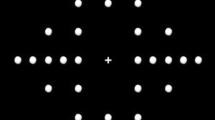Summary
Subjects frequently produce matching responses to Wason's selection problem. Some authors have proposed that such responses are a result of information processing functions which are lateralised to the right hemisphere and that compete with left hemisphere verbal/logical processes for the control of overt responding. Support for this position has come mainly from studies of patient populations. The present paper reports a series of experiments in which attempts were made to obtain similar confirmation from normal subjects using the technique of selective hemispheric interference. Subjects worked on the selection problem while concurrently performing a unimanual balancing task. Weak but persistent effects of hemispheric interference on the pattern of responses th the selection porblem were observed. In general, the data are consistent with the hypothesis that matching responses reflect right hemisphere processing.
Similar content being viewed by others
References
Bracewell, R.J., & Hidi, S.E. (1974). The solution of an inferential problem as a function of stimulus materials. Quarterly Journal of Experimental Psychology, 26, 480–488.
Evans, J. St.B. T. (1982). The Psychology of Deductive Reasoning. London: Routledge & Kegan Paul.
Evans, J. St.B. T., & Dennis, I. (1982). Brain lesions and reasoning: a note on Golding, Cortex, 18, 317–318
Evans, J. St.B. T., & Lynch, J.S. (1973). Matching bias in the selection task. British Journal of Psychology, 64, 391–397.
Golding, E., Reich, S.S., & Wason, P.C. (1974). Inter-hemispheric differences in problem solving. Perception, 3, 231–235.
Golding, E. (1981). The effect of unilateral brain lesion on reasoning. Cortex, 17, 31–40.
Hellige, J.B., & Longstreth, L.E. (1981). Effects of concurrent hemisphere-specific activity on unimanual tapping rate. Neuropsychologia, 19, 395–405.
Kinsbourne, M. (1970). The control of attention by interaction between the cerebral hemispheres. In A.F. Sanders (Ed.) Attention and Performance III. Amsterdam: North-Holland.
Manktelow, K., & Evans, J. St.B. T. (1979). Facilitation of reasoning by realism: effect or non-effect? British Journal of Psychology, 70, 477–488.
Rosenthal, R. (1978). Combining the results of independent studies. Psychological Bulletin, 85, 185–193.
Wason, P.C. (1966). Reasoning. In B.M. Foss (Ed.) New Horizons in Psychology. London: Penguin.
Wason, P.C. (1968). Reasoning about a rule. Quarterly Journal of Experimental Psychology, 20, 273–281.
Author information
Authors and Affiliations
Additional information
These experiments were reported at the Oxford meeting of the Experimental Psychology Society, 1983
Rights and permissions
About this article
Cite this article
Gellatly, A.R.H. Hemisphere specific effects in reasoning performance. Psychol. Res 47, 217–221 (1985). https://doi.org/10.1007/BF00309449
Received:
Issue Date:
DOI: https://doi.org/10.1007/BF00309449




